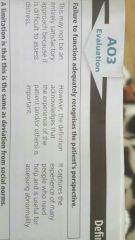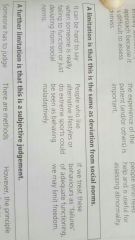![]()
![]()
![]()
Use LEFT and RIGHT arrow keys to navigate between flashcards;
Use UP and DOWN arrow keys to flip the card;
H to show hint;
A reads text to speech;
18 Cards in this Set
- Front
- Back
- 3rd side (hint)
|
Statistical infrequency |
- defines abnormality in terms of statistics & - how frequently a behaviour occures - any behaviour that is seen frequently in a population is seen as normal - any behaviour the isnt seen frequently is thought of as abnormal |
4 points |
|
|
Example: of statistical infrequency |
-The average IQ is 100 -most people have an IQ between 85 and 115 - only 2% have a score below 70 These people are statistically unusual or abnormal and are diagnosed with intellectual disability disorder |
IQ intellectual disability disorder |
|
|
Deviation from socail norms |
- based on socail context - societies and socail groups make collective judgments about 'correct' behaviours in particular circumstances -when person behaves in a way that is different from expectations they are defined as abnormal - few behaviours r considered universally abnormal therefore definitions r related to cultural context - this includes historical difficulties within the same society E.g. homosexuality= normal in some cultures but not others & was considered abnormal in our society in the past |
Societies and socail groups make collective judgements... |
|
|
Example of deviation from socail norms |
-Important symptom of APD = failure to conform to 'lawful' and culturally normative ethical behaviour. - psycopaths are abnormal because they deviate from socail norms or standards & - generally lack empathy |
Antisocail personality disorder |
|
|
Strength 4 statistical infrequency |
Strength = real life applications - all assessments of patients with mental disorders includes some comparison to stastical norms -intelluctual disability disorder demonstrates how statistical infrequency can be used - statical infrequency is thus a useful part of clinical assesment |
|
|
|
Limitation of statistical infrequency |
-Limitation= unusual characteristics can also be positive - if behaviour is statistically infrequent it is abnormal but that doesnt always mean the person requires treatment - IQs over 130 are seen as abnormal but are not regarded as undesirable and requiring treatment -this is a serious limitation of the concept of statistical infrequency and means it should never be used alone to make a diagnosis |
Unusual characteristitics can also be positive |
|
|
Further limitaion = not every1 unusual bennefits from a label |
- when some1 is living a happy and fulfilled life theres no bennefit to them being labelled as abnormal - e.g. some1 with a very low IQ who was not distressed or out of work, would not need diagnosis of intellectual disability - so being labelled as abnormal could have a negative effect on way other view them and on the way they view themselves |
|
|
|
Deviation from socail norms evaluation |
-Apd shows that there is a pkace for deviation from socail norma in defining what abnormality is - however there are other factors to consider e.g. distress to other people due to APD - so in practice, deviation from socail norms is never the sole reason for defining someone as abnormal |
Limitation =deviation from socail norms is not a sole explanation of abnormality |
|
|
Another limition 4 deviation from socail norms |
-Person from one cultural group may label a person from another cultural group as abnormal according to their standards rather than the persons standars - for example hearing voices is socailly acceptable in some countries whereas in england its seen as abnormal - this creates problems for people from one culture living with another cultural group |
Limitation = socail norms change with different cultures |
|
|
3rd limitation 4 socail norms |
-Too much reliance on socail norms to understand abnormality can lead to a systematic abuse of human rights - for example Drapetomania (black slaves trying to escape) & nymphomania (women attracted to working-class men) are examples of how diagnosis was used for socail control - these classifications appear ridiculus but some psychologists argue that modern abnormal classifications are abuses of peoples right to be different |
Definition could lead to human rights abuses |
|
|
Failure to function adequately |
-When a person reaches the point that they cant deal with the demands of everyday life they are regarded as abnormal due to failure to function adequately E.g. - cant hold down a job - maintain relationships, hygiene and basic standards of nutrition |
Cant deal with the demands of everyday life |
|
|
Rosenhan and Seligman proposed signs of failure to cope |
When someones not coping they: - no longer conform to interpersonal rules e.g. maintaining personal space -they experience personal distress -they behave in a way thats dangerous is irrational or dangerous |
|
|
|
Example= intellectual disability disorder |
Having a low IQ is a statistical infrequency but diagnosis wont be made on this basis alone. - there would have to be clear signs that, as a result of this, the person was not able to cope with the demands of everyday life. - so intellectual disability disorder is an example of failure to function inadequately. |
|
|
|
Deviation from ideal mental health |
-This involves thinking aboutnwhat makes somone 'normal' and psychologically healthy -then identify anyone who deviates from this ideal. |
|
|
|
Marie jahoda listed 8 criteria for ideal mental health |
1. No symptoms or distress 2. Rational and percieve themselves rationally 3. Self- actualise 4.can cope with stress 5. Realistic view of world 6. Good self-esteem and lack of guilt 7. Independent of other people 8. Can successful work, love and enjoy their leisure |
|
|
|
Inevitable overlap between definitions |
Someone ability to keep a job may be a sign of their failure to cope with the pressure of work = failure to function Or as a deviation from the ideal of successful working |
|
|
|
Evaluation 4 failure to function adequately |

|
|
|
|
Limitation is that failure to function = same as deviation from socail norms |

|
|

